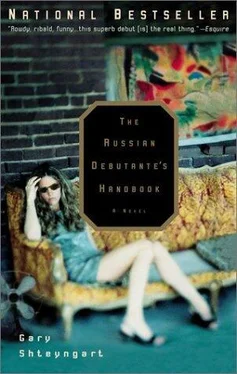Gary Shteyngart - The Russian Debutante's Handbook
Здесь есть возможность читать онлайн «Gary Shteyngart - The Russian Debutante's Handbook» весь текст электронной книги совершенно бесплатно (целиком полную версию без сокращений). В некоторых случаях можно слушать аудио, скачать через торрент в формате fb2 и присутствует краткое содержание. Город: New York, Год выпуска: 2003, ISBN: 2003, Издательство: Riverhead Books, Жанр: Современная проза, Юмористическая проза, на английском языке. Описание произведения, (предисловие) а так же отзывы посетителей доступны на портале библиотеки ЛибКат.
- Название:The Russian Debutante's Handbook
- Автор:
- Издательство:Riverhead Books
- Жанр:
- Год:2003
- Город:New York
- ISBN:0-7865-4177-6
- Рейтинг книги:4 / 5. Голосов: 1
-
Избранное:Добавить в избранное
- Отзывы:
-
Ваша оценка:
- 80
- 1
- 2
- 3
- 4
- 5
The Russian Debutante's Handbook: краткое содержание, описание и аннотация
Предлагаем к чтению аннотацию, описание, краткое содержание или предисловие (зависит от того, что написал сам автор книги «The Russian Debutante's Handbook»). Если вы не нашли необходимую информацию о книге — напишите в комментариях, мы постараемся отыскать её.
and
. The Russian Debutante’s Handbook Bursting with wit, humor, and rare insight,
is both a highly imaginative romp and a serious exploration of what it means to be an immigrant in America.
The Russian Debutante's Handbook — читать онлайн бесплатно полную книгу (весь текст) целиком
Ниже представлен текст книги, разбитый по страницам. Система сохранения места последней прочитанной страницы, позволяет с удобством читать онлайн бесплатно книгу «The Russian Debutante's Handbook», без необходимости каждый раз заново искать на чём Вы остановились. Поставьте закладку, и сможете в любой момент перейти на страницу, на которой закончили чтение.
Интервал:
Закладка:
But still he wanted freedom from the Lord’s man in Prava, or at least a lighter schedule. More time to splash water on his face and get his bearings in the morning.
BY THE TIMEthey disembarked they were the only ones left on the train. At ground level the main smokestack of a factory rose dramatically above them like a NASA rocket with a serious fire in the capsule. In one direction a distant huddle of panelak s shimmered in the translucent chemical haze. In another direction there appeared to be a vast stretch of nothing. Kostya looked toward the nothing, using his hand as a visor against the late morning sun. Vladimir looked to the cherub and smiled, trying to appear both enthusiastic and confused. He made a few epic sweeps of the hand as if to indicate that the “nothing” was not a good thing and the powder towers and jazz clubs of the Golden City were really more his cup of grog.
Kostya remained unmoved. He found a bus schedule tacked on to an enormous electrified fence that enclosed the factory. “There,” he said. “There should be one now.”
And by the dictate of God, Kostya’s coconspirator, an entirely empty double-jointed bus, its two tremendous halves bound together by a thick oval of rubber, rounded the corner, raising dust in its wake. The bus stopped, let out a long sigh as if overcome by its loneliness for passengers, and opened its many doors.
THEY RUMBLED THROUGHthe fields of emptiness, the giant factory growing distant in the dirty rectangle of the back window. The empty fields looked to Vladimir as if they had been tortured by Romania’s dreaded Securitate, the soil randomly upturned and heaped into mounds or depleted into mini-canyons.
Kostya sat pensively, his hands cupped together as if he was praying already, which might have been the case. “You know, my mother’s very sick,” he said without the customary preamble.
“How terrible,” Vladimir quickly replied.
“Yes. I don’t know how it will turn out. I’m going to pray for her.”
“Of course.” Vladimir fidgeted quietly. “I’ll pray for her too.”
Kostya gave his thanks and turned to the window and the empty view. “If you want,” Vladimir said, “I can give you the money to fly her to Austria for better medical treatment. That is, if you need the money.”
“I thought about that. Of doing it with my own money. But I want her in Russia in case she… I want her to be surrounded by her own people.” Vladimir nodded as if he could appreciate the sentiment, but somehow the phrase “her own people” reminded him of the fact that these concerned and helpful (and mythical) Russians of the medical profession were a far cry from his own people, whom Kostya’s mother would probably not appreciate milling about her deathbed with their legendary big noses and dirty hands. But then again, that was just an assumption. There were some Russians who weren’t like that. Kostya, for one, knew of Vladimir’s missing foreskin and never said anything derogatory. On the other hand, he was taking him to church.
Amid the empty fields they came across “The International Technological Joint Venture—FutureTek 2000,” announced by a freshly painted billboard on the side of the road. It resembled something of a Victorian-era factory mated to a grain silo, really just a collection of thick, rusted pipes and bulbous metal containers joined together at odd angles. To think that somewhere within this pastiche of industrial decay a new fax modem was waiting to be born was to invest too much hope in the resilience of the human spirit.
Now, thought Vladimir, you take some white plaster walls, throw them up around the factory, perforate a mock-tinted window along one of the sides, stick a couple of recycling bins out front, and presto! Why sell worthless shares to Stolovans at ten crowns a pop, when you can unload them to Americans at ten dollars? He made a note.
THE CHURCH WAShiding behind the factory, with a small field of failing carrots separating the two. It looked rather Appalachian, the church did—a little corrugated tin shack with a metal Orthodox cross that gleamed amid the empty surroundings like a television antenna bringing news of civilization beyond. “Please,” said Kostya and opened the door for him.
You couldn’t mistake the parishioners for anything but Russians. Tired, stern faces that even in the meditative act of prayer looked ready to kick some ass for their fair share of beets, sugar, and a parking space for the beat-up Lada microsedan. Broad, heavy bodies bursting with thick veins and copious sweat, looking as if they had been somehow blown out of proportion by a diet of meat and butter—par for the course in a world where one had to appear as formidable as a tank to start the wheels of distribution turning.
Kostya bowed to a few of them and pointed at Vladimir, eliciting several difficult smiles and the tiniest of whispers. Vladimir hoped he looked more like Jesus than Trotsky to them, but an icon above the altar showed the prototype of the one whose second coming was awaited—a very gentile Christ indeed, with light brown hair verging on dirty blond, the traditional soft-focus physiognomy, and, of course, a look of supreme transcendence that Vladimir didn’t even want to begin to fathom. Yup, he was in church.
But it wasn’t too shabby, the service. There was a certain uncertainty to the message, the way the priest, as bearded and robed and wizened as could be (you knew you were getting your piety’s worth with this guy), would belt out, singsong-like: “Je-sus has risen!” and the crowd would reply in unison, “Verily, He has risen.” Nice the way this central fact had to be constantly affirmed. But of course, He has risen. What would it all mean if He hadn’t risen, eh, Vanya?
And crossing yourself was great too, kneeling and crossing endlessly. It felt good—swift and powerful. The goys were good with the swift-and-powerful shtick. Columbus and his wooden armada sweeping into the New World on an Atlantic breeze and a prayer; the medieval English galloping through hot, dusty Palestine bedecked in a ton of steel. Crossing, always crossing themselves. Before the Hebrew God you could only bow repeatedly and feel sorry about your place beneath Him, but with Christ there it was, with your hand—up, then down, then right, then left. Christ has risen? Why, yes, verily.
Vladimir must have crossed himself impressively because several of the babushkas, their blue eyes glowing within their shawls, were clearly taking note of his vigorous motions and loud proclamations. Kostya gave him a smile so wide it could have been redeemed for a place in Heaven. This went on for a while, the tiny room suffused with the brightness of candles and a pair of oversized, out-of-place halogen torchieres like the floor samples Vladimir had seen at the German department store. The smell of sweat and the incense swung about by the priest was getting a bit heady and just as Vladimir was making sure the back door was still present and accessible, Christ was resurrected one last time and it was all over.
They lined up before the priest who kissed them in turn and said something brief to each congregant. Waiting on line, Kostya introduced Vladimir to a couple of nice old ladies whose doubts about “the dark one” had dissipated over the course of the services like the whoosh of stale air released over the empty horizon upon the opening of the front door. The priest kissed Vladimir on the left cheek and the right, his breath smelling surprisingly of dill pickles, and said, “Welcome, my dear young one. Christ has risen.”
“Yes, um,” said Vladimir, although there was, of course, a better way of saying it; they had, in fact, just said it three hundred times. But His Holiness, broad-shouldered and erect despite his considerable age, with his booming voice and pungent kisses, would make even the most godless members of the Spartacist League quiver in their ankle-high Doc Martens. “You must be Greek,” the priest said.
Читать дальшеИнтервал:
Закладка:
Похожие книги на «The Russian Debutante's Handbook»
Представляем Вашему вниманию похожие книги на «The Russian Debutante's Handbook» списком для выбора. Мы отобрали схожую по названию и смыслу литературу в надежде предоставить читателям больше вариантов отыскать новые, интересные, ещё непрочитанные произведения.
Обсуждение, отзывы о книге «The Russian Debutante's Handbook» и просто собственные мнения читателей. Оставьте ваши комментарии, напишите, что Вы думаете о произведении, его смысле или главных героях. Укажите что конкретно понравилось, а что нет, и почему Вы так считаете.












